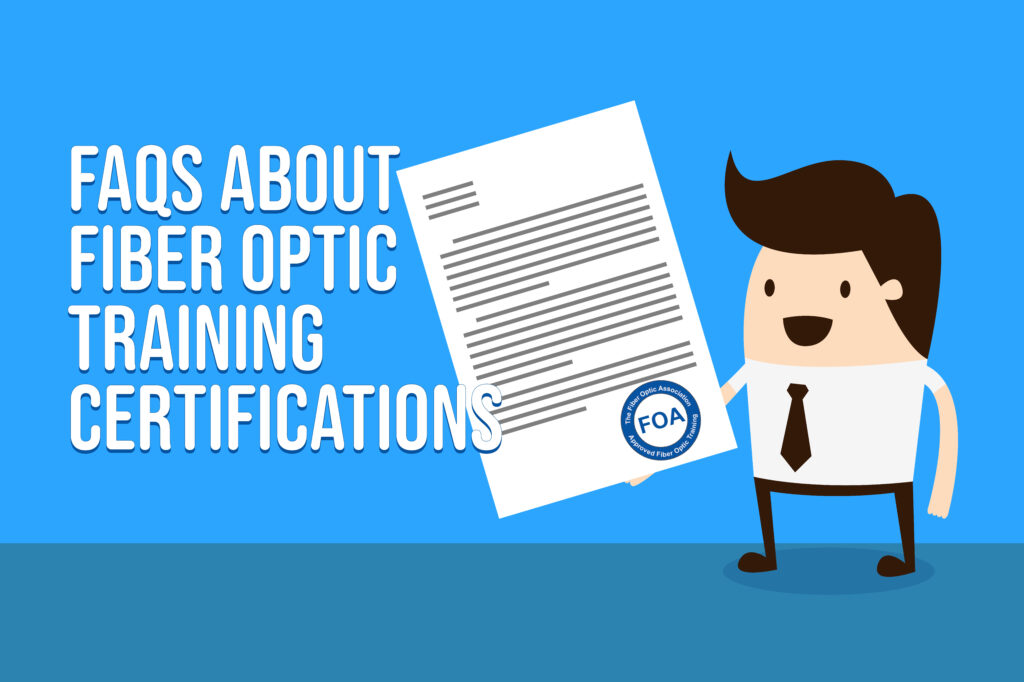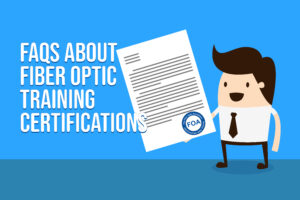If you’re eyeing to pursue a career in the field of fiber optics, it is undeniable that there are a lot of skillsets you have to develop. Other than getting some experience in the field, it’s also useful that you apply for further fiber optic certifications in order to achieve this.
The certifications you get from the FOA are more than just credentials to entice employers to hire you, it is an instrument that you can use to hone your knowledge and expertise in this field. As a matter of fact, these certifications are designed to show you the growth of your knowledge, skills, and abilities (KSAs) in fiber optic applications.
To help you understand the relevance of these certifications, here’s a list of frequently asked questions about fiber optic training certifications that probably crossed your mind:
FAQ #1: What Is the Essence of Training Employees in Fiber Optics?
At present, many organizations of all types and sizes require their employees to undergo training programs in fiber optics. This is because of its ability to make the process of communicating and transmitting digital data easier and faster. Aside from that, it was also prevalent how fiber optic training certifications also increased fiber optic technicians’ productivity and performance in the field.
Here are 3 ways recognized training certifications helped technicians advance in their career in fiber optics:
-
It Can Help a Technician Get Hired Faster

Many job positions in the field of fiber optics today require technicians to have the necessary training experience from Nexus-net or other similar industry organizations. That’s why it’s ideal to undergo these training programs if you want to stand out from the rest of the applicants. Most of the time, hiring managers see technicians with training certifications as a high or medium priority during their candidate evaluation process. With that said, it is evident that fiber optic certifications have the power to help technicians get ahead.
-
It Can Make a Technician an Expert in The Field of Fiber Optics
Fiber optic certifications have high value in validating the expertise and skills of fiber optic technicians. It shows hiring managers that the applicant is an expert in the field of fiber optics. For this reason, these recruiters often prefer job candidates that have training experience when it comes to infrastructure-related positions. When you take responsibility for your own training, you will surely be recognized to be a qualified applicant.
-
It Can Increase a Technician’s Market Value
Aside from helping technicians to get hired faster and to be recognized as an expert in the field, certifications also increase their market value. Training programs and certifications clearly play a significant role in the preparation of fiber optic professionals for the evolving infrastructure market. That’s why when you take a look at the network infrastructure industry today, you will see that the technicians who underwent training programs for certifications earn more than those who didn’t.
FAQ #2: How Are Certifications Acquired?
There are different ways that you can acquire your fiber optic certification. But first, it’s essential that you understand how fiber optic certifications work. Generally, technicians start working with their certified fiber optic technician certification before they work to achieve higher level certifications.
Now that you have a grasp of how certifications work, it’s time for you to learn how to become FOA-certified in fiber optics. Here are three ways that you can accomplish this easily:
-
FOA-Approved Fiber Optic Technician Training Programs
One way that you can acquire fiber optic certifications is through attending FOA certification training programs. Through this training, you will be able to learn the knowledge and skills necessary to become a competent fiber optic technician. This includes fiber optic cable preparation, splicing, termination, and testing.
Just like other training programs, FOA certification applicants take an exam after they pass a formal application and meet all the requirements. Most often than not, the certified fiber optic technician exam is offered at the end of training classes. The proctor can be a supervisor, teacher, or instructor as long as they’re not a co-worker or relative of the applicant. Furthermore, applicants can arrange their exam to be taken online or on paper with a proctor.
-
Direct Certifications (Work to Cert)
Apart from attending training programs, you can also be eligible for fiber optic certifications if you’re currently working in the field of fiber optics. All you have to do is to keep your experience at work documented.
Generally, fiber optic technicians are qualified to apply for direct certifications when they have been active for at least two years in the field. You will still need to pass the FOA certification exam in order to be certified, but you are no longer required to undergo the training beginners usually attend to.
-
Specialist Certifications
If an applicant is aiming to get advanced certifications, they are often required to have a documented experience. Hence, it’s ideal for fiber optic technicians to keep a record or logbook of their experiences in the field. Other than the field experience, technicians can also take a specialist course from FOA-approved schools in order to be knowledgeable about the different fiber optic skills and applications. Through that, they’ll be able to establish themselves as competent specialists in the business world.
FAQ #3: What Knowledge Is Required to Be Certified?

Just like in every field of expertise, there are certain knowledge, skills, and abilities necessary in order for you to become a professional fiber optic technician. To help you achieve this aim, here’s a list of KSAs you need to acquire before you can become a competent certified fiber optic technician:
Knowledge
- Familiarity with the fiber optic jargon.
- Fiber optic communications systems.
- Different types and specifications of optical fiber.
- Different kinds of fiber optic cable and their uses.
- Fiber optic cable termination and splicing.
- Different splicing processes.
- Fiber optic testing.
- Types of fiber optic network design.
- Proper fiber optic installation.
Skills
- Proper handling of fiber optic cables
- Splicing preparation and execution of fiber optic cables.
- Termination preparation and execution of fiber optic cables.
- Proper utilization of fiber optic testing tools and equipment.
Abilities
- 10th-grade level reading and math.
- Clear eyesight with color rendition.
- Excellent hand-eye coordination.
- Able to use hand tools and power tools.
- High analytical skills.
- Compliant to the directions given.
- Able to work in adverse conditions.
Evidently, these KSAs enable technicians to pass the CFOT certification exam with ease. That’s why it’s important to hone them well in formal training classes. Aside from that, you can also pick up these KSAs if you work in the field.
FAQ #4: How Are the Certification Applicants’ Skills Examined?
Basically, the students in FOA-approved training classes for CFOT certifications are trained to execute basic hands-on skills that are necessary for the field. During the process, the assigned instructor of the class will evaluate the applicant’s abilities to learn these skills. Furthermore, you will be asked to submit documentation of your experience and acquired training programs in fiber optics if you’re one of those applicants with field experience. In other words, your skills as a fiber optic technician will be examined based on your training or work performance.
FAQ #5: Do FOA Certifications Expire?
If you want to stay competitive in the field of fiber optics, the FOA will require you to renew your certification every three years. As you can see, the fiber optic technician certification is considered by employers or hiring managers as proof of the applicants’ professional status in their field. That’s why it’s important to renew your FOA certification regularly. When you fail to renew your certification, the FOA will note in their database that you are no longer active in the field of fiber optics.
FAQ #6: How Do You Re-establish Your Expired FOA Certification?
The expiration date of an FOA certification can be found in the technician’s certification identification card. If it so happened that you misplaced your card, you can contact FOA to check your status and request for a replacements ID card.
There are two ways you can renew your expired FOA certifications. You just have to check whether your certification expired under or over three years. If your certification expired within the last 3 years, you can renew it online or print a renewal form and send it to FOA. However, if your certification expired more than 3 years ago, you will have to re-establish your FOA fiber optic technician credentials. In order to do this properly, you will have to retake the certified fiber optic technician exam online or sign up for a CFOT review class.
Without any doubt, the acquisition of fiber optic training certifications enables technicians to gain the upper hand as they pursue their field of expertise. That’s why it’s ideal that you acquire these training programs from reputed FOA-approved organizations like Nexus-net. Over the years, Nexus-net has produced numerous competent certified fiber optic technicians. With this organization’s assistance, you will be able to get the knowledge, skills, and abilities needed for you to provide high-quality service.



